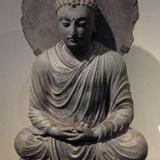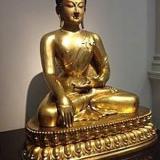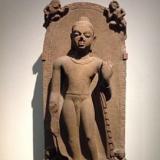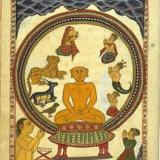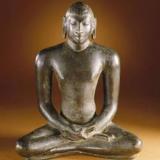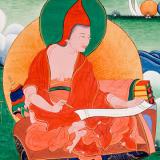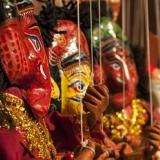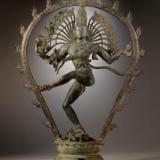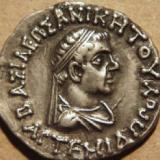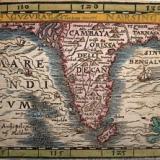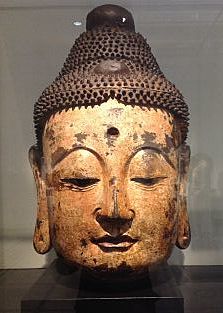Buddhists and Jains
In this last section of the podcasts on ancient Indian thought, we move on to consider the development of Buddhist thought, focusing on Nāgārjuna, the second century founder of Mādhyamaka Buddhism, the great Yogacārā Buddhist thinker Dignāga, and the reaction to his thought in Dharmakīrti. We also cover Jain philosophy, focusing especially on Umāsvāti. Major philosophical themes in this sub-series include epistemology, with the brilliant skeptical methods of Nāgārjuna and the perspectivism of the Jains, as well as critique of Vedic ideas about the self. Our treatment of Indian philosophy (for now at least: we may return to cover later Indian thought in a future series of episodes) will conclude with a look at cultural interchanges between Indian thought and other cultures.
Look out for interviews with Amber Carpenter, Marie-Helene Gorisse, Graham Priest, and Jan Westerhoff, with a surprise appearance by a special guest to round off the whole series.
• L.A. Babb, Understanding Jainism (Edinburgh: 2015).
• P. Balcerowicz, Essays in Jaina Philosophy and Religion (Delhi: 2003).
• P. Balcerowicz, Early Asceticism in India: Ājīvikism and Jainism (London: 2016).
• S.C. Berkwitz, South Asian Buddhism: a Survey (London: 2010).
• A.D. Carpenter, Indian Buddhist Philosophy (Durham: 2014).
• E. Conze, Buddhist Thought in India (Ann Arbor: 1967).
• E. Conze, Buddhism: a Short History (Oxford: 2008).
• P. Dundas, The Jains (London: 2002).
• W. Edelglass and J.L. Garfield (eds), Buddhist Philosophy: Essential Readings (Oxford: 2009).
• W. Edelglass, P.-J. Harter, and S. McClintock, The Routledge Handbook of Indian Buddhist Philosophy (London: 2022).
• P. Harvey, An Introduction to Buddhism: Teachings, History and Practices (Cambridge: 2013).
• A. Hirakawa, A History of Indian Buddhism, trans. P. Groner (Honolulu: 1990).
• P.S. Jaini, The Jaina Path of Purification (New Delhi: 1998).
• J.L. Jaini, Outlines of Jainism (Cambridge: 2013).
• B.K. Matilal, The Central Philosophy of Jainism (Ahmedabad: 1977).
• M. Siderits, Studies in Buddhist Philosophy (Oxford: 2016).
• J. Westerhoff, The Golden Age of Indian Buddhist Philosophy (Oxford: 2018).
• P. Williams and A. Tribe, Buddhist Thought: a Complete Introduction to the Indian Tradition (London: 2000).
Posted on
An introduction to philosophical developments in Buddhism and Jainism up to the time of Dignāga in the sixth century AD.
Posted on
Nāgārjuna founds the Mādhyamaka (“middle way”) Buddhist tradition by “relinquishing all views” and arguing that everything is “empty.”
Posted on
Nāgārjuna applies his emptiness theory to motion, change, and cognition.
Posted on
Nāgārjuna’s four-fold argument scheme, the tetralemma (catuṣkoṭi).
Posted on
A discussion with Jan Westerhoff, an expert on the great Buddhist thinker Nāgārjuna, dealing with the notion of emptiness, the tetralemma, and Nāgārjuna's reception in India and Tibet.
Posted on
The Jain theory of standpoints or non-onesidedness (anekāntavāda) makes truth a matter of perspective.
Posted on
Does the Jain theory of seven predications (saptabhaṇgī) land them in self-contradiction, or help them to avoid it?
Posted on
We're joined by Marie-Hélène Gorisse for a look at the Jain theory of knowledge.
Posted on
Vasubandhu’s path to Yogācāra Buddhism, a form of idealism which holds that nothing can be mind-independent.
Posted on
The great Buddhist thinker Dignāga argues that general concepts and language are mere constructions superimposed on perception.
Posted on
Dignāga’s trairūpya theory, which sets out the three conditions required for making reliable inferences.
Posted on
Graham Priest joins Peter to discuss non-classical logic and its connections with Buddhist patterns of reasoning.
Posted on
Dignāga argues that all perception is accompanied by self-awareness.
Posted on
Buddhaghosa, a major figure in the history of Buddhism in Sri Lanka, argues against the need for a self to control and coordinate mental activities.
Posted on
Philosophy is put into practice in Kashmir Śaivite Tantra and Buddhist Tantra.
Posted on
An interview about the status of nonhuman animals in ancient Indian philosophy and literature.
Posted on
Did Indian ideas play a role in shaping ancient Greek philosophy?
Posted on
The impact of ancient Indian thought upon the Muslim scholar al-Bīrūnī and upon European thinkers like Hume, Hegel, and Schopenhauer.
Posted on
A whirlwind tour of developments in Indian philosophy after Dignāga and a few words about the contemporary relevance of the tradition.
See the India timeline here on the site for the various names mentioned in this episode.
Posted on
The host of the History of India podcast joins us for the final episode on India.




